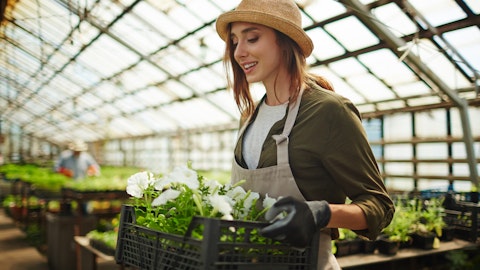So, this whole time where we’ve been talking about our potential joint venture, and obviously we couldn’t name names until the deal was done, but we — that doesn’t mean we weren’t focused on it and that we weren’t laying the groundwork because time is so important in agriculture and that and Shell was not working with us even before the agreement was signed. So we’re really focused on camelina in the US other oil seeds that people have talked about, or Coronada which is a cousin to Camelina and a few others. Right now, soybeans are being used a lot for oils, for diesel production, but we’re not probably going to get into the soybean business. We like these cover crops that are planted after food crops because they give us a second, they give the farmer and us a second source of oil production and they don’t affect the price of food.
In 2024, so the geographic implication of your question, we will start looking at camelina in Australia. So Shell has a conversion plant for biodiesel Green Diesel in Asia, in Singapore and wants us to supply DBO to supply oil to that plant next and we’ll be working on other facilities and other geographic regions over the next decade that Shell also has other production facilities. So we’re not — so we’re now focused on really improving camelina and geographically expanding our production out of the US to other worldwide markets. We’ll start breeding programs on other seeds, but we haven’t done more than collect germplasm and do the normal things that a seed company does on the other crops, but it’s a big — it’s a big opportunity and we’re sort of so thankful that we have this joint venture with Shell and we’re all excited about what that means in the future.
Ben Klieve: Got you. No, it’s certainly is exciting, those helpful context. One more question for me and then I’ll get back in line, the million dollars of Double Team revenue that was realized in the second quarter, certainly appears to be more sooner than you would’ve expected. Can you — is there anything to read into that that — were there farmers, distributors that were just so eager to get this in hand that they bought this earlier than was expected? Or was this, kind of a random occurrence? Really, what drove the premature realization of that initial piece of revenue for this year?
Mark Wong: Yeah, the market’s very, very excited about Double Team and they saw it last year in small amounts, and our philosophy if we haven’t talked about it is we, we basically go to farmers and we say show us the acre of your, that’s your readiest and buy Double Team for that. And if we can solve your grass weed problem on that weedy acre, then maybe you should consider planning Double Team on the rest of your farm. And so, the small number of farmers we had last year, we’re very impressed with the performance of the product in herbicide resistance as I’ve seen over the over the decades since I’ve been doing this, once a farmer converts to one herbicide, he usually only wants that one herbicide on his own farm. So he won’t keep a couple of different kind of herbicides because he’s concerned that maybe someone who works for him might spray the wrong herbicide.




